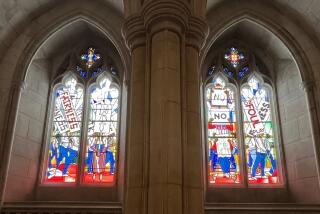Q&A: 40 years after composing ‘Satyagraha,’ Philip Glass is still inspired by Gandhi’s march for justice
Like the familiar, undulating chords of his compositions, Philip Glass is in a state of perpetual motion.
At 81, the world’s most famous taxi driver-turned-composer is busy traveling, composing, performing and, when necessary, taking to the streets to march for social justice and political change.
Glass is still deeply moved by the ideas and actions of Gandhi, the subject of his 1979 opera, “Satyagraha,” which will receive six performances at Los Angeles Opera beginning Oct. 20.
On his way up the California coast from Carmel to San Francisco, Glass had just wrapped up the eighth iteration of his organization’s annual “Days and Nights Festival” when he spoke with The Times by phone about “Satyagraha,” Gandhi and his hopes for the future of opera and American society.
Los Angeles Opera is staging director Phelim McDermott and scenery designer Julian Crouch’s visually rich 2007 production of “Satyagraha.” What is it about this particular version of the opera that still resonates?
It’s a beautiful production. I’m very happy to see it traveling around.
For “Satyagraha,” it’s helpful to have something that is very pictorial, which is what they’ve done. The way they do it really pulls the story together I think.
You composed “Satyagraha” 40 years ago. How do you think its themes connect today?
The tools for creating change through nonviolence – techniques like burning registration cards or marching – those were really developed by Gandhi.
We inherit them because Martin Luther King Jr. was inspired by it. He normalized it and turned it into an American thing. But the genius idea really comes from a much earlier time.
I was marching during the Vietnam period. And now in recent years I’ve been at the women’s marches. I go with the whole family. This is understood to be one of the ways by which we can effectively command the attention of the government and show them we’re not happy with what they’re doing. Gandhi was really the beginning of social change, and we’re still doing it that way today.
I loved learning that the word “Satyagraha” means “Truth Force,” a title that feels particularly relevant today.
Well, we don’t call it “fake news force.”
The 1st Amendment is freedom of speech. There’s nothing more important that keeps our country going than that. Right now the attack on freedom of speech is right in front of us. I think if Gandhi were alive today, he’d be talking about that.
One recurring visual theme in this production is newspapers, a reference to Gandhi’s early 20th-century publication “Indian Opinion.”
That’s not in the libretto. It’s a brilliant invention of the director and designer.
The thing about opera is that it’s not a question of interpretation; it’s a reinvention of an idea. When we listen to people play different versions of the same Beethoven sonatas, we hear a different interpretation. This is profoundly different. One of the reasons I like this production is that Phelim and Julian’s way of telling the story is a reinvention.
This opera and Gandhi’s life work are rooted in a profound sense of hope that the world can be a better place and change can happen. Where do you see reason to hope that change can happen in America today?
Oh, I see it right now. I think we’re going to see more and more marches. We know how to do that now.
Now we’re talking about this whole gender business. More than half the people are considered not equals to the other half! But I think we’re going to see in the election coming up, people are going to be very vocal. There won’t just be women on the streets, there’ll be husbands and brothers and grandfathers standing along with them. It’s going to be very powerful.
Speaking of gender, you’re a male composer and “Satyagraha” is part of a trilogy of operas you wrote about great men in history. I wonder if you were creating this trilogy today if you might consider a woman as the protagonist and, if so, who that might be?
It has to be a charismatic character to carry the story. We haven’t had that in our politics for a long time. For this I had to go back a hundred years to Gandhi.
I did an opera called “Appomattox,” and in that opera you have the wives – Lincoln’s wife and Lee’s wife. They become part of the story, but the main story is about the men of course.
I think we need a little more time for the women to emerge who are leading us, and then that will happen. There are a number of women doing operas now. If you look around, you’ll see that a lot of theater is being led by women now. It is only a question of time before women become part of the content, and not just the presentation.
Speaking of contemporary opera, what is your favorite opera you’ve seen recently?
Well, I just saw one of my own [chuckles]. We did “In the Penal Colony” here in Carmel. But there are some wonderful pieces right now by younger composers. Nico Muhly is doing a new opera for the Met. He’s only [37] years old. I didn’t even start writing opera until I was 35. He’s a brilliant young guy.
More to Read
The biggest entertainment stories
Get our big stories about Hollywood, film, television, music, arts, culture and more right in your inbox as soon as they publish.
You may occasionally receive promotional content from the Los Angeles Times.






